|
Boris Sidis, Ph.D., M.D. 
At Sidis Psychotherapeutic Institute,
Portsmouth NH.
|
"An uncompromising
intellectual honesty that impelled him to a blunt outrightness with regard to whatever seemed to him erroneous or
mischievous, and it is not difficult to understand why during his
lifetime Boris Sidis did not enjoy the full measure of recognition which
he merited, and which it would seem certain will eventually be accorded
to him." |
|
 "My right eye is amblyopic; for it, things are enshrouded in a mist. When my
left eye is closed and a book is opened
before me I am unable to tell letter from figure; I see only dots, rows of
them, all indistinct, hazy, oscillating, appearing and disappearing from
my field of vision."―The Psychology
of Suggestion,
Chap. 17
"My right eye is amblyopic; for it, things are enshrouded in a mist. When my
left eye is closed and a book is opened
before me I am unable to tell letter from figure; I see only dots, rows of
them, all indistinct, hazy, oscillating, appearing and disappearing from
my field of vision."―The Psychology
of Suggestion,
Chap. 17
|
 Biographical Sketches and Photographs
Biographical Sketches and Photographs
 The Essential Boris Sidis
by Dan Mahony
The Essential Boris Sidis
by Dan Mahony
Boris Sidis
Bibliography

Clickable
and Printable
Sample of his books
online here...
Click
book covers or underlineds to read / save / print.
To print in b/w select all,
copy, and paste into word processor.
Click empty space on page
to activate mouse-wheel scrolling.
Text size can be
adjusted in 'View' window.
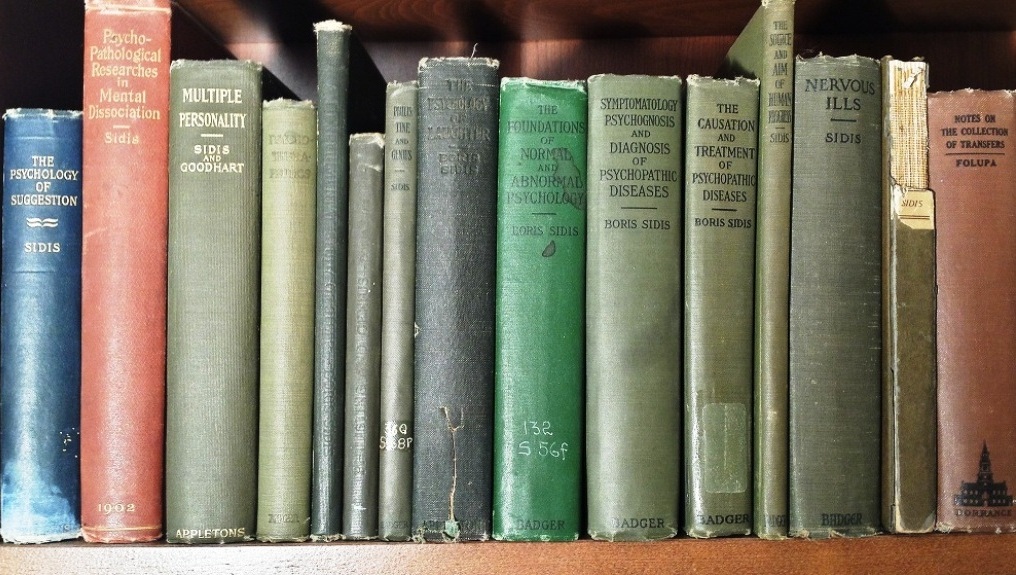
LEON HANSEN'S SIDIS COLLECTION
| The Psychology of
Suggestion | Psychopathological Researches | Multiple Personality | Psychotherapeutics |
An Experimental Study of Sleep | Philistine and Genius (1911) | Philistine and Genius
(1917) |
The Psychology of Laughter | The Foundations of Normal and Abnormal Psychology | Symptomatology Psychognosis
and Diagnosis of Psychopathic Diseases | The Causation and Treatment of
Psychopathic Diseases | The Source and Aim of Human Progress | Nervous Ills
W. J. SIDIS
| The Animate
and the Inanimate | Notes on the Collection of Transfers |
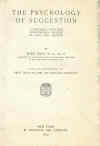
THE
PSYCHOLOGY OF SUGGESTION
(1898)
"My mode of hypnotization consists in forming a monotonous environment;
the light
is lowered, and a profound silence reigns in the room;
then gently and
monotonously stroking the skin of the subject's forehead,
and in a low, muffled,
monotonous voice, as if rocking a baby to sleep,
I go on repeating, 'Sleep, sleep, sleep,' etc., until the subject falls into the hypnotic
state."
Chap.
6
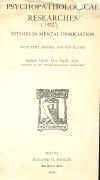
PSYCHOPATHOLOGICAL
RESEARCHES
(1902)
with
William Alanson White, M.D., and George M. Parker, M.D.
"Great
stress is laid on re-association, or synthesis of dissociated systems.
From a therapeutic point of
view, synthesis
is cure."
Intro
"A
bitter controversy developed, and in the end he and his associates were swept
from office with their work unfinished, and the Institute was reorganized on a
'practical' basis. For a time the little band of investigators found refuge in a
private laboratory, but ere long lack of funds caused their dispersal, Dr. Sidis
removing to Brookline, Mass., where he continued his scientific work."―H.
A. Bruce
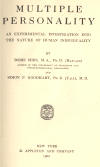
MULTIPLE PERSONALITY
(1904)
"The individual is a
composite,—a multiple individuality." Chap. 1

Psychotherapeutics
A Symposium by Morton Prince... Frederic H. Gerrish...
James J. Putnam...E.W. Taylor... Boris Sidis... George A.
Waterman... John E. Donley... Ernest Jones... Tom A. Williams
(1908,
1909, 1912)
|
"Important, however, as the following-up of the history or of the
psychogenesis of the symptoms may be, both to the physician and to the patient,
for an intelligent and scientific comprehension of the case, it does not cure,
as some are apt to claim, the psychopathic malady." Chap. 6
"Most important, however, is the access gained through the agency of
the hypnoidal state to the stores of potential subconscious reserve-energy,
which, by a liberation of energy, bring about a re-association and synthesis of
the dissociated mental systems underlying the symptoms o f the disease."
Chap. 6 |
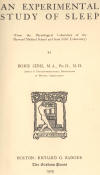
AN
EXPERIMENTAL STUDY OF SLEEP (1909)
"The
hypnoidal state precedes and succeeds sleep."
Chap.
9
"In the study of sleep
then we must devote our attention to the investigation of transitory
subwaking
states which form the transition between waking and sleeping."
Chap. 4

PHILISTINE
AND GENIUS
(1911)
"The principle of recognition of evil under all its guises
is at the basis of the
true education of man."
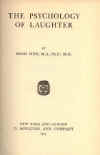
THE
PSYCHOLOGY OF LAUGHTER
(1913)
"What
is there in the object of merriment that unloosens the pent-up energies
resulting in the psychomotor activities of laughter?"
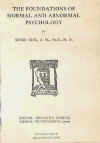
THE
FOUNDATIONS OF NORMAL
AND ABNORMAL PSYCHOLOGY
(1914)
"There is no special controlling
agency somewhere in the mind sending out orders, mandates, inhibitions, like a
despotically ruling autocrat, like a psycho-analytic censor, or like an
omniscient, omnipotent, omnipresent, invisible deity
Part
II, Chap. 9."
"Chance
variations form the matrix out of which the purposive psychic process arises.
Not
purpose, but chance is at the heart of mental life
Chap.
15."
"Science
is the description of phenomena and the formulation of their relations."
link
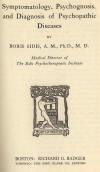
SYMPTOMATOLOGY,
PSYCHOGNOSIS, AND DIAGNOSIS
OF PSYCHOPATHIC DISEASES
(1914)
"The phenomena that lie on the borderland of
what is regarded as normal mental activity are of great interest and importance,
because, being deviations or variations from the normal and the familiar, they
are apt to call attention to the mechanism, causation and laws that govern
mental activity in general―normal and abnormal, conscious and subconscious."
"Distasteful as it is for me to do it, I find it
my duty to enter a protest against the vagaries and absurdities of psychoanalysis which is nothing but a
pseudo-science, the same as astrology, oneiromancy, palmistry and magic."

THE CAUSATION AND
TREATMENT OF PSYCHOPATHIC DISEASES
(1916)
“The
fear instinct is the ultimate cause of the infinite varieties of psychopathic
diseases.” Chapter V
“Himself first and last, that is the essence of psychopathic life.” Chapter
XI

THE
SOURCE AND AIM OF HUMAN PROGRESS
(1919)
"The
full development of a synthetic unity of the conscious in control of the
subconscious in a pure atmosphere ofliberty is sure immunity against all mental
plagues, and is at the same time
the source and aim of all true human progress."
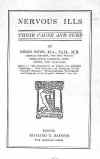
NERVOUS
ILLS: THEIR CAUSE AND CURE (1922)
"...a
brief popular account of my work in abnormal psychology for the past
quarter of a century."

At Sidis Psychotherapeutic Institute, Portsmouth NH,
1912
"When
he died he had just begun the Psychology of the Folk Tale."
"In
fact we have some partially completed manuscripts on the subjects
which we hope
sometime to publish."
Selected
articles...
|
Foundations of Psychology |
|
Neuron
Energy and its Psychomotor Manifestations
(1898) |
|
Remarks on a review of The Psychology of Suggestion
(1898) |
|
The Nature and
Principles of Psychology
(1899) |
|
I An
Inquiry into the
Nature of Hallucinations (1904)
|
|
II An Inquiry into the
Nature of Hallucination (1904) |
|
Review
of Freud's The Psychopathology of Everyday Life
(1906) Letter to William
James re Freud's book
(1905)
|
|
Are There Hypnotic Hallucinations?
(1906) |
|
Doctrine of Primary and Secondary Sensory
Elements
(1908) |
|
Review of Gustav
Störring's Mental
Pathology and its Relation to Normal Psychology
(1908) |
Fundamental
States in Psychoneurosis
(1910)
This article was part of an
angry controversy over psychoanalysis: "Sidis'
remark is of course unpardonable, and Prince should not have allowed it
to be printed; one will be bound to ignore him in the future."―Ernest
Jones
Letters |
|
Dreams
(1912) Short review of the literature, bibliography. |
|
The
Mental Factor in the Diagnosis and Treatment of Functional Diseases (1912) |
|
Consciousness
(1914) |
|
The
Psychopathology of Neurosis (1915) |
|
Treatment Methods |
|
The
Psychotherapeutic Value of the Hypnoidal State
(1909)
|
|
How Dr. Sidis Hypnoidizes His Patients
by H. A. Bruce (1910)
|
|
Masters of the Mind
by H. A. Bruce (1910) |
|
Psychopathic Aphonia, Stammering and Catalepsy
(1917) |
|
A
Clinical Study of a Dream Personality (1918)
|
|
The Value of the Method of
Hypnoidization in the Diagnosis and Treatment of Psychopathic Disorders
(1919)
"The whole process is one of disintegration and reintegration
of psycho-physiological neuron systems with the awakening of dormant, reserve
energy, resulting in a complete and permanent cure of the patient."
|
|
"Great
stress is laid on re-association, or synthesis of dissociated systems. From a therapeutic point of
view, synthesis
is cure."
Psychopathological
Researches
|
|
"My mode of hypnotization consists in forming a monotonous environment;
the light is lowered, and a profound silence reigns in the room; then gently and monotonously stroking the skin of the subject's forehead,
and in a low, muffled, monotonous voice, as if rocking a baby to sleep, I go on repeating, 'Sleep, sleep, sleep,' etc., until the subject falls into the hypnotic state."
Psychology
of Suggestion
|
|
Psychology and Education
|
|
Precocity
in Children
(1919)
"Ontogenesis is an epitome of
Phylogenesis. This biogenetic law holds true in the domain of education. The stored-up
experiences of the race are condensed, foreshortened, and recapitulated in the child's life
history. This process of progressive "precocity," or of foreshortening of education, has been going on unconsciously in the course of human evolution. We have reached a stage when man can be made conscious of this fundamental process, thus getting control over his own growth and development." "We should remember that there is genius in every healthy, normal child."
|
|
Lecture
on the Abuse of Fear Instinct in Early Education
(1919)
"The
aim of education of children is self-perfection. We should
surround our young with the graceful, the true, the beautiful, the good, the
kind, the lovely, and the loving."
|
|
Social
Psychology
|
|
A
Study of the Mob (1895)
|
| The
Study of Mental Epidemics
(1896)
|
THE
PSYCHOLOGY OF SUGGESTION, PART III, SOCIETY
(1897)
"The subwaking mob self slumbers within the bosom of society."
|
|
Fear, Anxiety, and Psychopathic Maladies
(1911) |
| Neurosis and
Eugenics (1915) |
| Foreword to
"A Remark on the Occurrence of Revolutions" by William James
Sidis
(1918) |
|
Time Crowding As A Factor in Influenza
(1918) |
| The
Source and Aim of Human Progress (1919) |
|
Laboratory
Experiments |
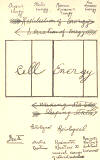 An Experimental Study of Sleep
(1909) An Experimental Study of Sleep
(1909)
|
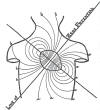 The
Nature and Causation of the Galvanic Phenomenon
(1910)
The
Nature and Causation of the Galvanic Phenomenon
(1910) |
I Laboratory
Instruments
Used by Boris Sidis
Laboratory
Instruments
Used by Boris Sidis |
Reviews of Boris Sidis's Books and Articles
|
Ernest Jones
Letters re "The controversy over
Psychoanalysis,"
March, 1911
Sidis wrote: "Some
of Freud's admirers, with a metaphysical proclivity, are delighted over
the theory of suppressed wishes. The wish is fundamental and prior to all
mental states. This piece of metaphysical psychologism is supposed to be based on clinical experience. If
wishes were horses,
beggars would ride. The Freudist manages to ride such horses."
Wrote Jones: "Sidis'
remark is of course unpardonable, and Prince should not have allowed it
to be printed; one will be bound to ignore him in the future."
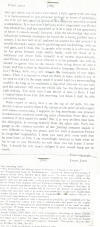
(Click / tap images to open, again to enlarge.)
|

|






















